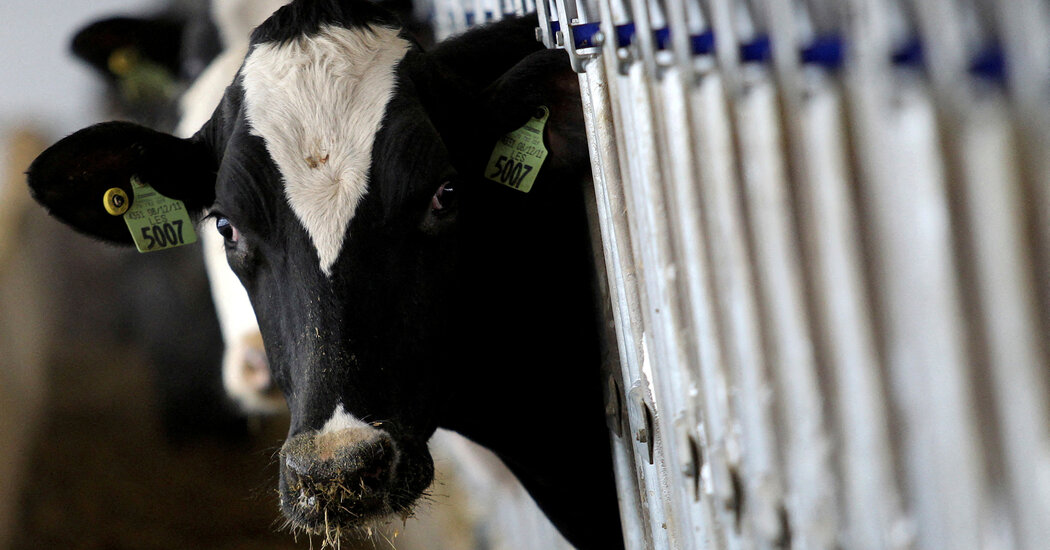
Bovine tissue from a sick dairy cow tested positive for the avian influenza virus, federal officials said Friday.
According to the US Department of Agriculture, the cow was ordered to be slaughtered because it was sick and the meat was not included in the food supply. The department continued to emphasize that the commercial food supply remained secure.
But the positive test, which is part of an ongoing federal study on the safety of beef, raises concerns that the virus could enter the commercial beef supply, posing a risk to human health.
So far the virus, known as H5N1, has only been detected in dairy cattle and not in beef cattle raised for meat. But experts believe the outbreak is larger than the official count of 58 affected dairy farms in nine states.
“It is clear that this situation is widespread and will require constant vigilance,” said Brian Ronholm, director of food policy at Consumer Reports, an advocacy organization.
Overall, he said, he believes the risk to consumers remains low. But, she added, “it will be important for consumers to ensure they cook meat to the appropriate temperature for further safety.”
Officials and experts said that thorough cooking could destroy any viruses that might enter the meat; Preliminary laboratory tests on ground beef support this idea. .
But Dr. Gail Hansen, an independent food safety and veterinary health expert who has criticized the federal government's response to the dairy cow outbreak, said officials were overly confident in the safety of beef.
“People eat rare and even raw meat,” he said. “So, once again, assurances from government agencies, before science can confirm or disprove hypotheses, continue to undermine public trust.”
The USDA said the fact that inspectors identified the diseased cow and prevented its meat from entering the food chain was proof that its protocols were working. But some infected cows are asymptomatic and may not be detected by such inspection systems. The agency found no viruses in ground beef samples collected from retail outlets in states where cows tested positive.
So far, the agency's Food Safety and Inspection Service has tested tissue samples from 96 dairy cows that had been condemned for signs of disease. Only samples from one cow tested positive for the H5N1 virus, according to the agency, which is analyzing additional muscle samples.
The findings released Friday are further indication that people should be careful when cooking and preparing meat, said Dr. David Acheson, former medical director of the Food Safety and Inspection Service at the USDA. Food safety experts always recommend cooking meat thoroughly to prevent infection from common pathogens such as salmonella, listeria and E. coli.
“These food safety recommendations were in store long before H5N1 became a problem, and they should always be our baseline standard,” said Dr. Keith Poulsen, director of the Wisconsin Veterinary Diagnostic Laboratory at the University of Wisconsin -Madison.
Earlier this month, the USDA released the results of an experimental study in which researchers added high concentrations of the virus to beef patties. The researchers found no viruses present in the meat when they cooked the hamburger to 160 degrees Fahrenheit, the internal temperature of a well-done hamburger, or 145 degrees Fahrenheit, the temperature of a hamburger cooked to medium.
However, the virus was present in rare hamburgers, cooked at 120 degrees, albeit at significantly reduced levels; the agency said cooking at that temperature “essentially inactivated the virus.”
“All the indications are: You cook your food, even if there's a virus in it, it's going to kill it,” said Stacey Schultz-Cherry, a virologist and flu expert at St. Jude Children's Research Hospital.
Experts would like to know more about the positive sample, including the levels of virus it contained, said Matthew Moore, a food science expert at the University of Massachusetts, Amherst. It is unclear whether the virus was viable or inactivated. Whether people can contract bird flu from eating contaminated food remains an open question, though. A study published Friday found that unpasteurized milk contaminated with the virus made mice sick, raising concerns among experts that consuming raw milk could harm humans. Several cats have also died after drinking contaminated raw milk.
